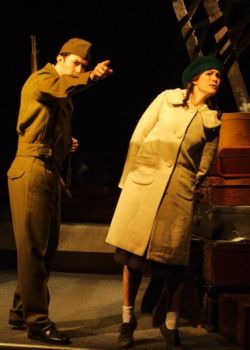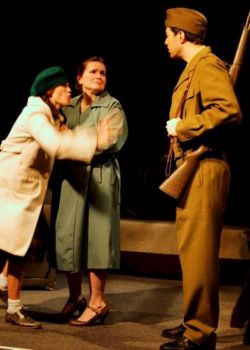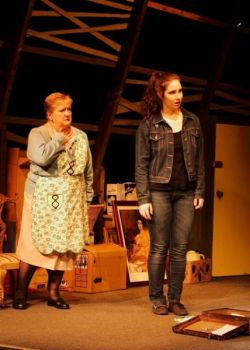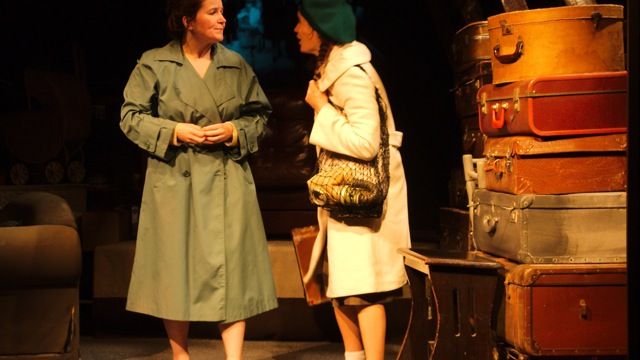Kindertransport
The stage is a cluttered attic hunkering under wooden beams. Old suitcases line one wall, cardboard boxes the other. Worn, rejected pieces of furniture and forgotten toys litter the space. “There are stories here,” the set suggests, “memories and history.” And as the title and notes from Director Carla Moore imply, the stories go way back to the late 1930s, to Germany, and the terror and violence of the anti-Semitism that crytalised with the Kristallnacht, the Night of Broken Glass.
So the audience is prepared, one would think, for a play about memories, but when Evelyn (Catherine Potter) and her daughter Faith (Adriane White) push through the attic door, switch on the light and begin arguing about what things from the attic Faith should take with her when she moves out, the past is momentarily forgotten. For the moment, we see the present, and a typical mother-daughter dilemma.

Neither of them is really happy about Faith moving away, but neither do they seem very happy together. There is a tension in their relationship that is a little strange, a tension that seems as cluttered and enclosed as the abyss of the set itself. Symbolically, the dialogue and their reactions begin to suggest that there is more here than either is prepared to admit. Faith doesn’t really want cups and saucers, and she certainly doesn’t want the crystal wine glasses that Evelyn begins to polish so obsessively that the stem will break …
In her memory it does. There is the sound of breaking glass. Momentarily she freezes, and her hands shake a little. Almost she loses the stability, which we begin to see she keeps under very careful control. Why, we wonder, is Faith’s leaving affecting her so much? Then the moment goes. The arguing continues. Evelyn leaves, and Faith is left in the attic. Naturally she begins to explore. She finds a toy train, a whole box of dolls – and an old suitcase …
And now Evelyn’s past, its sadness, fear, loneliness, and eventually her guilt, is revealed.
To say anymore about the plot will give too much away. This play is so carefully constructed and so sensitively directed that it needs to be seen, experienced. Books, memoirs, plays and films about the Holocaust and its legacies ensure that it is not forgotten and this beautifully written little play is a poignant reminder of just one terrible part of it.
 Present and past merge as the cast take us from Hamburg to Manchester, with Catherine Potter having to take Evelyn to points of almost heart-breaking emotion. It is a difficult role and she sustains it with careful and sensitive control. Adriane White’s Faith provides the contrast needed to heighten the relationship. She is alternatively frustrated, bemused, angry as she digs, relentlessly, into her mother’s past.
Present and past merge as the cast take us from Hamburg to Manchester, with Catherine Potter having to take Evelyn to points of almost heart-breaking emotion. It is a difficult role and she sustains it with careful and sensitive control. Adriane White’s Faith provides the contrast needed to heighten the relationship. She is alternatively frustrated, bemused, angry as she digs, relentlessly, into her mother’s past.
Breaking the tension of their relationship is grandmother, Lil, played by Jan Johnson who has created a gentle but strong character whose wry humour and warmth lift the action, until she, too, realises something that shakes her visibly.
On the other side of the attic, amid the suitcases, Evelyn’s past emerges. Played by Catherine McNamara, we see 9-year-old Eva, preparing to leave her home and parents as the Nazi pogroms, symbolised in the story of The Rat Catcher, begin. McNamara captures the original naivety of young Eva, her fear as she begins her new life and the eventual destruction of her beliefs and her identity over the next seven years. Evelyn’s tight self-control is founded in Eva’s desperate need to deal with things no child should ever have to experience.
 Julie Moore, as Eva’s mother, controls her fear for her daughter, and the future she herself faces, in gentle remonstrances that are filled with underlying emotion. It, too, is a hard role, especially as the play draws to its conclusion.
Julie Moore, as Eva’s mother, controls her fear for her daughter, and the future she herself faces, in gentle remonstrances that are filled with underlying emotion. It, too, is a hard role, especially as the play draws to its conclusion.
The character of young Lil, the English woman who takes Eva into her home, and her heart, is played Paula Searle. Her compassion for the young German child is heart warming – and links demonstrably with the older version of herself portrayed by Johnson.
The only male in the cast is Troy Cheney, who moves from German guard, to organiser of the children arriving in England, to postman and British army officer. Though short, each role serves to transports Eva on her journey, from Germany to Harwich to Manchester - and, almost, away from Lil as an evacuee.
Carla Moore has a love of making history come to life on the stage – and a vested interest in this particular part of history – and this production is testament to her careful research, strong direction and ability to tap and develop the strengths and talents of her cast.
Carol Wimmer
Subscribe to our E-Newsletter, buy our latest print edition or find a Performing Arts book at Book Nook.

